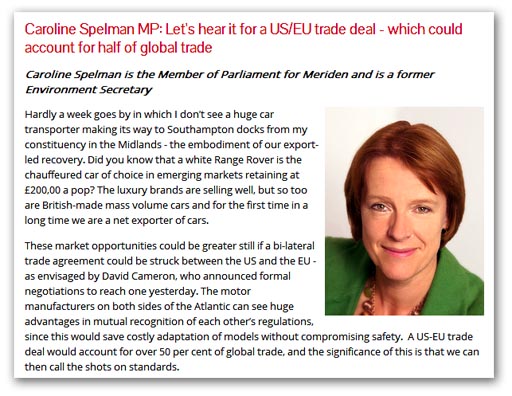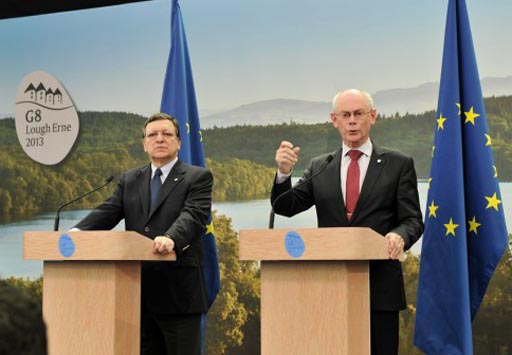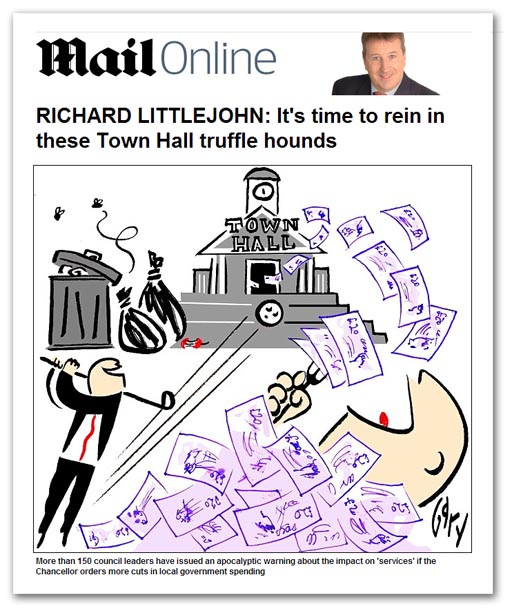EU regulation: ignorance at large
Wednesday 19 June 2013
A US-EU trade deal would account for over 50 per cent of global trade, and the significance of this, she says, "is that we can then call the shots on [vehicle] standards". Frankly, I don't know what is sadder or more alarming – the fact that we don't call the shots on standards any more, or that a former environment secretary doesn't know this. But, as we pointed out in an earlier post, vehicle regulation is an exclusive competence of the European Union which, in turn, is an active player in the automotive global harmonisation process through the UNECE and theWorld Forum for Harmonization of Vehicle Regulations (WP.29). This, we also learn through this Commission Working Document, and in particular page 5, which tells us: Active participation by the European Commission in activities related to the 1958 and 1998 [UNECE] Agreements is crucial to ensure that EU interests are taken into account. Therefore, European Commission services continuously increase their involvement in the Geneva technical legislative process, in particular by working within WP.29 and its subsidiary bodies in order to ensure harmonisation between UNECE Regulations and EU legislation. This is particularly important since Regulation (EC) No 661/2009 on the general safety of motor vehicles (the GSR) repealed numerous EU Directives and replaced them with UNECE Regulations.As it stands, the United States, although a founding member of UNECE, does not apply the vehicle harmonisation agreements. Thus, UNECE Regulations are not recognised in the US and vehicles exported to the United States have to undergo type approval mandated by the Federal Government. In the unlikely event that there is an US-EU deal agreed, what will then happen is that the US will work through the UNECE/WP.29 process, on the basis of existing agreements. Then, the regulations will be agreed between the big players - the Asian countries, including Japan and South Korea (India is only an observer), the United States and the EU, all of which will have seats at the top table.
The UK. of course, will not have a vote, much less a seat. It is represented by the EU and, as we see, the EU votes on standards, on behalf of 27 (soon to be 28) Member States. Thus, we do not now "call the shots on [vehicle] standards" and we will not ever "call the shots", as long as we are members of the European Union. To "call the shots", we have to leave.
COMMENT: TRADE DEAL THREAD Richard North 19/06/2013 |
EU politics: Canada paves the way
Wednesday 19 June 2013
The article is in the Canadian Globe and Mail which tells us that the latest "Canada-EU trade deal" is threatened by infighting. This is the Comprehensive Economic and Trade Agreement (CETA), which was launched in June 2009, almost exactly four years ago. It is still nowhere near completion, and they think the US-EU deal is going to take a mere two years? And there I was last night, writing of the US-EU deal, "As time goes on and the talks begin to stall, optimistic stories will be replaced by tales of delays, bad feeling, and political infighting – all focused on the failure of the EU to close the deal". Now we see reported that, "Canadian trade negotiators are running up against bureaucratic infighting among European Union officials". The Globe and Mail is retailing that that Canadian prime minister might have to return home empty-handed after week-long negotiations, after EU officials backed away from earlier commitments. In more than one instance, the Canadians feel they had locked down agreement with the Europeans on a topic, only to see that consensus unravel because directorates in the EU bureaucracy hadn't signed off on the terms. They say this has happened in negotiations over trade in services, slowing the momentum of the talks. "The EU side seems increasingly incapable of getting its act together to close a deal", one Canadian source says. "The various competing directorates within the EU are fighting each other, which is leading to erratic moves such as backing away from earlier commitments – actions that are on the verge of bad faith. The EU has to demonstrate it's serious about cutting a deal". And now, bang up to date, we see a picture from the G8 summit and, from behind their wheelie bins, we see the real power behind the group (above), with Van Rompuy and Barroso delivering their end-of-summit joint statement. "Together with US President Barack Obama", they said, "we launched the historic negotiations for an unprecedented Transatlantic Trade and Investment Partnership between the European Union and the United States". There was not a mention of Mr Cameron. Despite the attempts by the likes of Caroline Spelman to talk up the Conservative leader, that statement reflects the reality. It is this pair, not Mr Cameron, who will be running the European end of the negotiations, and we'll soon be seeing exactly the same dynamics about which the Canadians are complaining.
At the moment, the talks are in the honeymoon phase. But, by 2015, when they are supposed to conclude, Mr Cameron will be facing the general election and his mind will be elsewhere. The talks will have entered a trench warfare stage, and we will hear little from the Conservatives, as the supposed deal will be nowhere in sight.
The following year will be the US general election and, as the implications for different states become apparent, presidential and Congress candidates will be briefing against the aspects of the deal in the "loser" states, in favour of "American jobs" and local pork. This will add layers of complexity and make settlement an impossibility. By the end of that year, as have the Canadians now, the Americans will have fallen out of love with the EU. President Obama will be out of office and Mr Cameron will be long gone. Only Van Rompuy and Barroso will be left, and they will be talking to themselves. COMMENT: TRADE DEAL THREAD Richard North 19/06/2013 |
Local government: confusion over cuts
Tuesday 18 June 2013
This is all very well and good but, if local authority spending was as low as a mere £114 billion, I wouldn't begrudge them a few hundred million bunce. As it happens, the latest figures (2011-12) give us an annual expenditure of nearly £162 billion, close to four times the defence budget and nearly £50 billion higher than the Express figure. To our surprise, though, that figure of near £162 billion actually represents a cut from £172 billion in 2010-11 and £168 billion in 2009-10. Pathetic though the cut is, representing about six percent on a historic peak, we have local authorities whinging about the scale, claiming they have taken a 33 percent cut in central government funding since 2010. The low-circulation Observer then translates this into a generic cut, giving the casual reader the impression that there have been swingeing double-figure cuts across the board, instead of a paltry six percent reduction in overall spending. What we are not told either is that the cut represent only a relatively modest clawback from a situation where the total government grant of nearly £24 billion in 1997-98 more than doubled to reach just short of £58 billion in 2010, the last year of the Labour administration. What has not been properly explored is the way that, as central government has reined back its grants and imposed limits on Council Tax, local authorities have upped their charges for a wide range of local services, and developed new revenue generation schemes of dubious legality. Thus, by 2009-10 we saw that "sales, fees and charges" plus "other income" almost matched Council Tax, a situation that has continued ever since. Yet, while even the Guardian is beginning to realise that there is something amiss, with local authorities using traffic fines as a means of revenue-raising, the media have not joined up the dots. Councils are making up for the drop in government grants and a freeze on Council Tax by upping their revenue-generation activities. Entertaining though it might be to have the likes of Littlejohn huffing and puffing about "waste and perks" – and rightly so – no one seems to be looking at this development, and pointing out that revenue-generation has become a vast new industry, gouging billions from the pockets of the public. I suspect that one of the reasons for the lack of coverage is the delay in producing statistics, with thelatest volume only published a few days ago, covering only the period until April 2012 – more than a year ago. But even this tells you that local government accounts for 23 percent of "total managed expenditure", making councils responsible for nearly a quarter of all public spending. This is serious billions and, after deducting the "non-grant income" - i,e. local revenue generation -it amounts to a £135 billion cost to local and central government taxpayers, or £2,544 per head in 2011-12. Not anywhere though, will you get serious reporting or any evidence that the national media begins to understand what is going on in local government. All it can manage is the occasional cheap shotround the fringes, in this case picking up on £262 millions-worth of expenditure over six years - less than £50 million a year for an operation which spends nearly £500 million a day.
Scrutiny at all levels is needed but here we have the media chasing the trivia and missing the big picture. It needs to follow both.
COMMENT THREAD Richard North 18/06/2013 |
Wednesday, 19 June 2013
Posted by
Britannia Radio
at
06:38
![]()
























